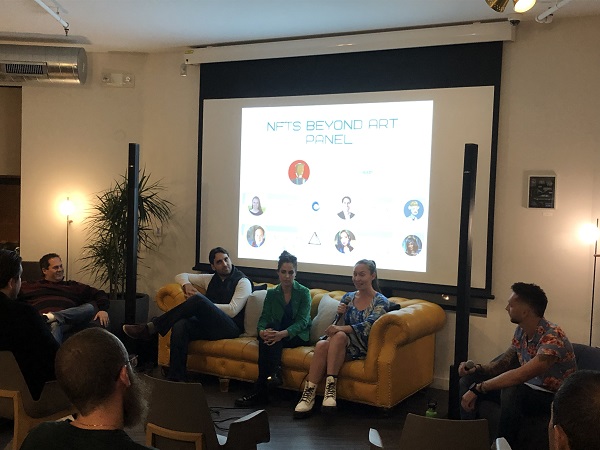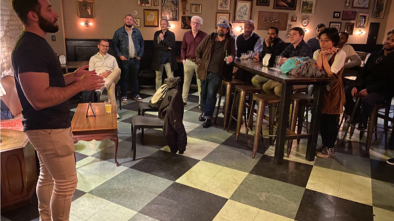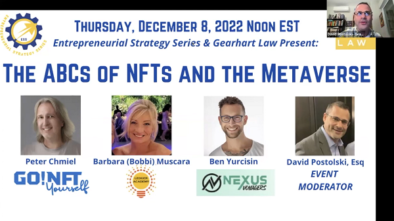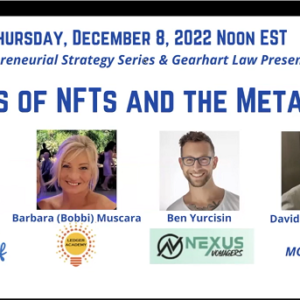Jersey City Tech Meetup Explores the World of NFTs and Building Community on the Blockchain
Jersey City Tech Meetup (JCTM) host Ben Yurcisin assembled a knowledgeable and diverse panel at the group’s most recent meeting to help enlighten many of us about why they personally care about NFTs, blockchain and related topics, and why the rest of us should potentially care, too.
To the uninitiated, NFT is the abbreviation for “non-fungible token.” Some of you may still be wondering…so what’s an NFT? One common, but technical, definition found on the Internet labels it a unique and non-interchangeable unit of data stored on a digital ledger.
Digital ledger? That would be a way of describing blockchain technology. A blockchain is a digital ledger of transactions (DLT) that is duplicated and distributed across a network of computer systems.
Blockchain is a type of DLT in which transactions are recorded with an immutable cryptographic signature called a “hash.” You can think of blockchain as a process of writing something once, and never being able to erase it.
NFTs can be used to represent reproducible items — including photos, videos and audio or other digital files — as unique items. Think “certificates of authenticity.”
Perhaps some real-life examples of NFTs and their relation to blockchain technology will become clearer if you’re still unsure about what’s happening in this fluid and fast-changing space.
The panelists for the evening were:
- Evin McMullen, cofounder and lead of Serto identity at ConsenSys (Brooklyn, N.Y.), a software engineering company focused on blockchain solutions. Serto catalyzes the adoption of decentralized technologies by resolving the critical identity blocker — the friction in using decentralized identity technologies, she said. In other words, part of McMullen’s job is verifying ownership and authorship of NFTs.
- Marguerite deCourcelle, cofounder and CEO of Blockade Games (Indianapolis), a blockchain video game development studio. Blockade has produced some of the longest-running experiences that blend blockchain with interactive entertainment. The company aims to attract millions of new crypto enthusiasts by introducing them to real digital asset ownership through top-quality, mainstream-independent, free-to-play game titles.
- Adam Sternbach, an associate at the law firm of McCarter and English (East Brunswick). Sternbach’s practice includes a specialty in advising entrepreneurs, startups, VCs and others attracted to the earlier-stage and alternative-investment classes, such as NFTs.
- Jonathan Goodman, owner of the Jersey City-based Trigonal Gallery, which focuses on emerging artists and secondary market collections. Trigonal hosts a wide range of art media from contemporary artists, including paintings, drawings, prints, sculptures, and photography, among others.
One of the more interesting themes that came up several times during the event was the concept of FOMO, or “fear of missing out,” even though NFTs have been around since 2015, when the first project was launched on the Ethereum blockchain. (Ethereum is a popular cryptocurrency, like Bitcoin.)
In the case of NFTs, perhaps a recent FOMO tipping point for people previously unfamiliar with them was when Christie’s auctioned its first-ever NFT, titled “Everydays: The First 5000 Days.”
That surprised many in the art world, especially when the NFT fetched an astonishing $69.4 million. This unfathomable price tag qualified it as the fourth most expensive artwork ever sold by a living artist.
In this case, the art was made by Mike Winkelmann — known to industry aficionados as Beeple. No doubt his artwork’s sale made international headlines and caused millions to rush to the internet, searching for answers about NFTs.
Here are some of the high-level highlights of the evening, including definitions of several key NFT/blockchain industry concepts.
- A Decentralized Autonomous Organization (DAO) is one of the mechanisms whereby online communities form, interact and coordinate together economically.
- For a DAO to function effectively, there has to be layers of structure and accountability that are discussed and agreed to in advance, with proper safeguards in place.
- A DAO functions differently from a corporation in that it is run by the members.
- Smart contracts are programs stored on a blockchain that run when predetermined conditions are met. They are typically used to automate the execution of an agreement, so that all the participants can be immediately certain of the outcome, without any intermediary’s involvement or time loss.
- A word to the wise: There is apparently no shortage of bad actors, scammers, unethical people, and dishonest organizations out there playing in this “sandbox.” For this reason, do not expect to make a lot of money with NFTs — the likelihood of that may diminish over time, according to Sternbach.
- Also, be extremely careful about the security of your wallet (where digital assets, including cryptocurrencies, are stored).
- Members of the panel highly recommended utilizing hard wallets (storage on a piece of actual hardware) and cold storage (on an offline wallet not connected to the internet), to help protect and shield you against someone gaining unauthorized access to your assets.
- Back your bitcoins/NFTs up, as an additional security measure against bad actors getting hold of what you rightfully own/control.
- Do not post any personal identification information on a blockchain.
- Fortunately, there are white hat hackers (ethical hackers) in the NFT and related online worlds. They specialize in penetration testing and other methodologies that ensure the security of an organization’s information systems.
- Black hat hackers, on the other hand, are criminals seeking to violate computer security with the intent of breaking into computer networks to steal or commit other malicious acts for personal gain or on behalf of others.
- Discord is a Voice over IP, or Voice over Internet Protocol (VoIP), which is an instant messaging and digital distribution platform where users communicate with each other by utilizing voice calls, video calls, text messaging, media and files in private chats or as part of communities called “servers,” which are a collection of ongoing chat rooms and voice chat channels.
- If you’re interested in learning more about the world of NFTs, JCTM recently launched the BeYu Labs Discord server. There is a link at the end of this article for anyone who would like to join this growing community.
- The metaverse is a virtual space within digital environments such as online games, social media and virtual reality.
- According to the panel, it’s much more fun to explore the metaverse with your friends, as opposed to going it alone.
- Exploring the metaverse is a combination of story, utility and community. In the aggregate, they form what value is brought to you and help you determine why you want to participate in this space.
- If you are interested or at least curious about investing in NFTs, or at least tracking their performance as an asset class, OpenSea is one of the leading peer-to-peer marketplaces tracking prices and transactions, along with other information.
- A filter of recently listed NFTs on OpenSea shows about 56 million different NFTs. Presumably, the supply/demand curve will somehow come into play here as a pricing factor.
- Several examples of creative and interesting NFTs were cited by panelists:
- The Bored Ape Yacht Club (BAYC) is a collection of 10,000 limited edition NFTs. Individual ape tokens act as memberships in the club. Its Discord server has approximately 48,000 members, and there are over 51,000 Instagram followers.
- The Royal Society of Players is a collection of 10,000 unmatched playing cards offering its members perks, prizes, and privileges that span both the metaverse and real world. The unique art — with no two cards alike — is done by Oban Jones, a world-renowned playing card artist and designer.
To watch videotaped versions of some past JCTM sessions – click here.
To join the JCTM Discord community – click here.




